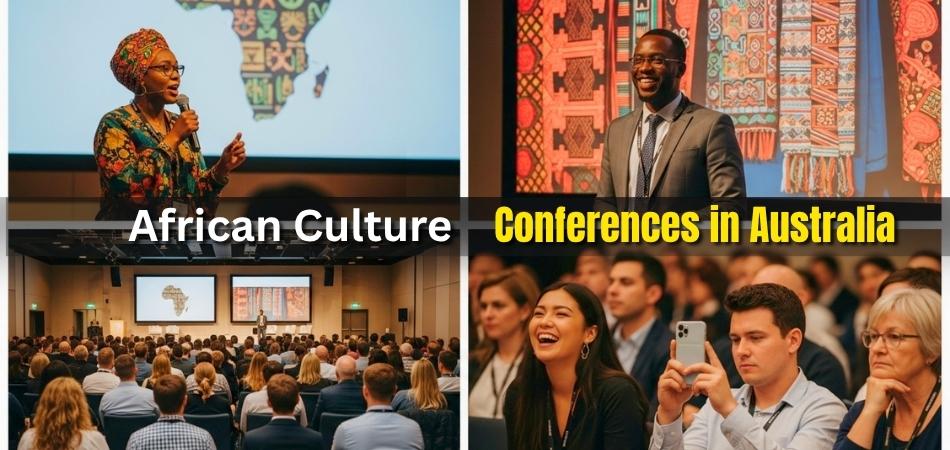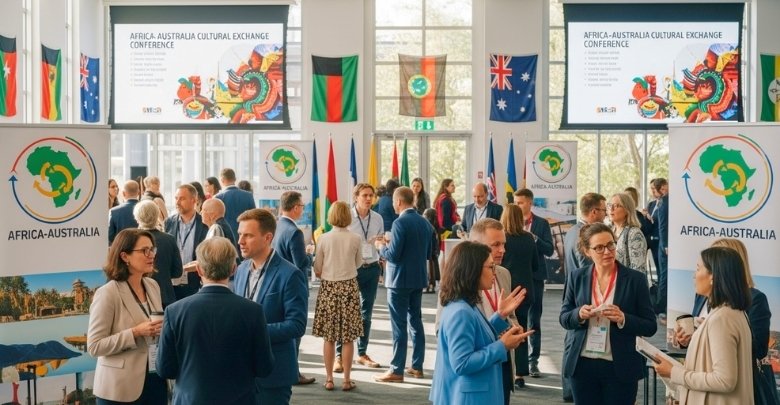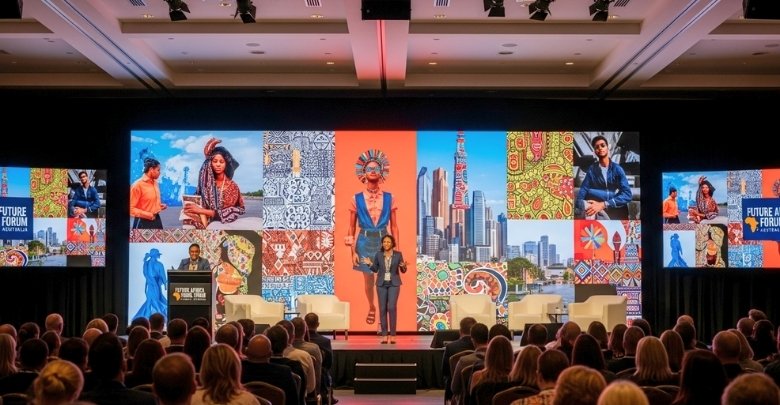African culture has an important role in forming global conversations, and Australia is becoming an active space for this dialogue. From universities to community groups, more people are engaging with African traditions through conferences, creating a stronger link between research, culture, and public understanding. The growing attention reflects a wider recognition of Africa’s impact on global society.
One of the highlights is the 69th Global Conference on African Economy and Culture, organized by Global Conference Alliance, which explores identity and economic ties. Another example is the African Studies Conference in Sydney, where scholars and communities share research and lived experiences. These gatherings reveal how Australia is opening doors to deeper cultural exchange.
The Top 10 African Culture Conferences in Australia show how ideas, traditions, and people come together in meaningful ways. Continue reading to explore the full list and discover how these events shape cultural understanding across the country.
Top 10 African Culture Conferences in Australia
| Date | Conference List | Location |
| November 14-16, 2025 | 69th Global Conference on African Economy and Culture (GCAEC) | Sydney, Australia |
| 27th and 28th November 2025 | African Studies Conference | Sydney, Australia |
| 12-14 November 2025 | AICCM National Conference 2025 | Brisbane, Australia |
| 13-14 November 2025 | Academy of the Humanities Annual Symposium | Sydney, Australia |
| 17–19 November 2025 | Australia ICOMOS 2025 National Conference and AGM | Ballarat, Victoria, Australia |
| February 02-03, 2026 | International Conference on Humanities, Administrative and Social Sciences | Melbourne, Australia |
| Jul 28-29, 2026 | Gender, Sexuality and Diversity Studies Conference | Sydney, Australia |
| April 13-14, 2026 | International Conference on Humanities, Social and Political Sciences | Melbourne, Australia |
| 22-24 September 2026 | Nineteenth International Conference on the Inclusive Museum | Chau Chak Wing Museum, University of Sydney, Sydney, Australia |
| 06th – 07th May 2026 | International Conference on Social Science and Humanities | Melbourne, Australia |
| 29 June to 2 July 2026 | 26th Biennial ASAA Conference 2026 | Deakin University, Geelong Waterfront, Victoria, Australia |
69th Global Conference on African Economy and Culture (GCAEC)
The 69th Global Conference on African Economy and Culture will bring scholars and professionals together to explore the links between economy and culture. It takes place in Sydney, Australia. Across November 14–16, 2025, participants will discuss African traditions, identity, and growth issues. Among major conferences in Australia, this event aims to create open discussions that connect cultural practices with modern economic contexts.
African Studies Conference
The African Studies Conference is an academic platform focusing on contemporary African issues, history, and identity. Held in Sydney, Australia, it provides space for local and international voices. Scheduled for November 27–28, 2025, the sessions explore politics, cultural narratives, and social research. The program allows researchers to share insights on Africa while building scholarly connections in the Australian setting.
AICCM National Conference 2025
The AICCM National Conference 2025 will address the conservation of cultural materials and heritage practices. It takes place in Brisbane, Australia, with specialists sharing applied research. The conference will run from November 12–14, 2025, focusing on real challenges in preserving objects, art, and cultural memory. Attendees can learn about new methods in conservation and the broader cultural impact of their work.
Academy of the Humanities Annual Symposium
The Academy of the Humanities hosts its Annual Symposium to examine new research across creative and academic fields. This year’s symposium is set in Sydney, Australia. On November 13–14, 2025, sessions will cover creative practice, cultural studies, and the role of the humanities in society. It is an opportunity to engage with projects shaping Australia’s research and education landscape.
Australia ICOMOS 2025 National Conference and AGM
Australia ICOMOS 2025 will bring together heritage professionals for dialogue on conservation and shared cultural spaces. The event takes place in Ballarat, Victoria. From November 17–19, 2025, members will meet for both the National Conference and AGM. The program highlights Australia’s architectural heritage, community involvement, and approaches to managing cultural landscapes in changing social and environmental conditions.
International Conference on Humanities, Administrative and Social Sciences
The International Conference on Humanities, Administrative and Social Sciences will feature discussions on cross-disciplinary issues. It is scheduled in Melbourne, Australia. The event will be held on February 2–3, 2026, creating a forum for ideas in education, management, and society. Researchers and practitioners will share recent studies and practical experiences relevant to the broader humanities and social sciences.
Gender, Sexuality and Diversity Studies Conference
Researchers and advocates will gather to explore themes of identity, equality, and cultural representation. It is hosted in Sydney, Australia. On July 28–29, 2026, the program will include presentations on LGBTQ+ issues, gender policies, and research findings. The conference creates academic space for critical discussions while connecting researchers working on diversity and inclusivity in both local and global contexts.
International Conference on Humanities, Social and Political Sciences
Academics and professionals will meet in Melbourne to discuss ideas shaping today’s societies. Taking place in Melbourne, Australia, it brings together academics and researchers. The dates are April 13–14, 2026. Attendees can expect sessions on governance, cultural studies, and social science debates. The event allows for sharing ideas on policies and theories that impact communities worldwide.
Nineteenth International Conference on the Inclusive Museum
The Inclusive Museum Conference explores how museums represent diverse voices and engage communities. It is hosted at Chau Chak Wing Museum, University of Sydney, Australia. Across September 22–24, 2026, the sessions will cover heritage, inclusivity, and public participation. The event provides a forum for museum professionals and researchers to examine practices that ensure cultural institutions remain relevant to society.
26th Biennial ASAA Conference 2026
Scholars and students will convene at Deakin University, Geelong Waterfront, Victoria, from June 29 to July 2, 2026. It will take place at Deakin University, Geelong Waterfront, Victoria, Australia. This meeting encourages dialogue on Asia–Pacific studies. The program welcomes a range of perspectives, creating academic exchanges on Asia’s influence in regional and global contexts.
The Role of African Culture in Australia’s Academic and Social Spaces
African culture has found a growing place in Australia’s academic and social environment. Universities, cultural centers, and community groups are exploring African traditions, arts, and history to enrich understanding. Conferences provide a practical bridge between research and society, ensuring that discussions move beyond classrooms and into public spaces where communities can actively participate. Here’s how African culture enriches Australia’s academic and social spaces.
African Studies in Universities
Australian universities now include African studies within humanities and global studies programs. These courses focus on African history, politics, and cultural identity, helping students gain a deeper understanding of Africa’s global role. By engaging with diverse research, universities are broadening perspectives and preparing students to contribute meaningfully in intercultural and global discussions.
Cultural Institutions Promoting Dialogue
Museums, galleries, and cultural centers play a vital role in representing African heritage in Australia. Through art exhibitions, storytelling events, and performances, these institutions create awareness about Africa’s cultural richness. Such initiatives invite local communities to experience African traditions, while also supporting intercultural understanding and strengthening social inclusion across diverse Australian settings.
Community Celebrations and Festivals
African communities in Australia organize festivals and cultural gatherings that showcase music, dance, and food. These events not only celebrate identity but also foster stronger bonds with the wider public. By sharing cultural practices, African Australians contribute to multiculturalism, encouraging respect and appreciation for diversity within the broader Australian social and cultural landscape.
Research and Knowledge Sharing
Academic research in Australia highlights African cultural contributions in fields such as literature, music, and social history. Conferences allow this research to reach wider audiences beyond academic journals. Scholars can present findings directly to community members, policy makers, and cultural leaders, ensuring knowledge flows into practical conversations that influence understanding and decision-making.
Conferences as Connecting Platforms
Conferences on African culture serve as vital meeting points between academia and the public. They allow scholars, artists, and community leaders to share insights on identity, heritage, and social change. In these spaces, dialogue shifts from theory to practice, enabling collaborative projects that reflect both research perspectives and community experiences across Australia.
The role of African culture in Australia is expanding beyond classrooms and performance halls. By combining research, community events, and cultural celebrations, conferences provide the link that unites scholarship with lived experience. This collaboration ensures African heritage is not only studied but also actively celebrated and shared within Australian society.
How Conferences Strengthen Cultural Exchange Between Africa and Australia?
Conferences act as active spaces where African and Australian voices meet. These events highlight art, language, and traditions, creating shared experiences that foster deeper cultural understanding. By encouraging dialogue and performance, conferences help Australians connect with African heritage. Here’s how conferences deepen cultural exchange between Africa and Australia.
Sharing African Art and Performance
Music, dance, and visual arts from African traditions often feature in conference sessions. Performances give audiences firsthand exposure to cultural expression while supporting African artists in Australia. This exchange builds appreciation and respect, turning conferences into spaces where art becomes a powerful tool for bridging cultural differences and enhancing mutual understanding.
Language and Storytelling Connections
Language plays a central role in cultural identity. Many conferences highlight African storytelling traditions, sometimes through workshops or bilingual sessions. These moments allow participants to engage with African languages while also exploring their deeper meanings. Storytelling opens dialogue on heritage, ensuring that African voices are heard and valued within an Australian context.
Building Academic and Community Links
Conferences bring scholars, artists, and community leaders together. Joint sessions often pair academic research with cultural performances, creating a balance between theory and practice. This collaboration gives communities a chance to connect with research that reflects their experiences, while academics gain insight from lived realities shared by African Australians and visiting participants.
Highlighting Diaspora Contributions
African diaspora communities in Australia often showcase their traditions at conferences, from culinary practices to contemporary art. These contributions demonstrate how culture adapts and thrives in new environments. By highlighting the diaspora’s role, conferences encourage Australians to see African heritage not only as distant but as an active and evolving part of their own society.
Encouraging Cross-Cultural Collaborations
Conferences frequently spark partnerships between Australian institutions and African communities. These collaborations may lead to cultural projects, exhibitions, or educational programs. By sustaining relationships beyond the event itself, conferences ensure that cultural exchange continues over time. This long-term impact strengthens ties and nurtures respect between both communities.
Through shared art, language, and lived experiences, African culture conferences build genuine cultural bridges in Australia. They go beyond lectures to create encounters where traditions are celebrated and differences respected. These exchanges help Australians better understand African heritage while giving African voices space to grow and be recognized within broader cultural conversations.
Challenges Faced by Organizers of African Culture Conferences in Australia
Organizing African culture conferences in Australia is rewarding but not without difficulties. Funding, accessibility, and representation often pose significant hurdles. By addressing these challenges openly, organizers create more inclusive events that not only highlight African heritage but also ensure broader participation and fairness for communities both within Australia and across Africa. Here are the main challenges organizers face when hosting African culture conferences in Australia.
Funding and Resource Limitations
Securing consistent financial support is one of the main struggles. Cultural events often rely on grants, sponsorships, or community fundraising. Limited budgets restrict the scale of programming, particularly for performances and workshops. Organizers are forced to balance ambition with financial reality, which sometimes limits the richness of cultural exchange at these conferences.
Visa and Travel Barriers
African delegates frequently face visa delays and high travel costs when trying to attend Australian conferences. These hurdles reduce the diversity of participants and weaken representation. Organizers work with embassies, advocacy groups, and universities to assist applicants, but navigating immigration requirements remains a persistent obstacle that affects attendance and inclusivity.
Raising Public Awareness
Despite growing multiculturalism, awareness about African culture conferences remains relatively low in Australia. Limited marketing budgets and competition with larger events make it harder to reach wider audiences. Organizers often depend on community networks and social media campaigns to spread the word, though this limits engagement beyond already interested groups.
Ensuring Representation and Inclusivity
Designing programs that reflect Africa’s diversity is another challenge. Africa’s many languages, cultures, and traditions cannot be captured by a single narrative. Organizers must carefully select speakers, performers, and themes to ensure fair representation. This requires collaboration with diaspora groups and cultural advisors to avoid narrow portrayals of African heritage.
Balancing Academic and Community Needs
Conferences often attract both academics and local communities, but meeting the expectations of each group is not easy. Academics may prioritize research-focused sessions, while communities prefer interactive cultural displays. Organizers strive to balance both, designing events that give equal space to scholarship and lived cultural experiences without alienating either audience.
These challenges highlight the complex reality of organizing African culture conferences in Australia. From visa barriers to inclusivity concerns, the obstacles are significant but not insurmountable. By adapting strategies and listening to communities, organizers continue to build stronger, more inclusive spaces that honor African heritage while connecting it to Australian society.
What Participants Gain Beyond the Conference Sessions?
Attending an African culture conference in Australia is not only about lectures and panels. The real impact often comes from the personal experiences that surround the sessions. Participants gain opportunities to connect with others, strengthen cultural identity, and leave with insights that extend far beyond the official program. Here’s what participants gain from African culture conferences beyond the main sessions.
Networking Opportunities
Conferences bring together academics, artists, students, and community leaders. Informal conversations during breaks or social events often spark collaborations and friendships. For many participants, these networks become long-term connections that support future projects, cultural initiatives, and even career growth, making the event a lasting source of opportunities.
Strengthening Cultural Identity
For African diaspora participants, conferences offer a chance to reconnect with heritage. Sharing traditions through music, language, or storytelling creates a sense of belonging. These moments help individuals affirm their identity while also educating others, reinforcing pride and recognition of African roots within the broader Australian cultural landscape.
Access to New Research
Beyond cultural displays, participants gain exposure to ongoing academic research. Presentations often reveal fresh perspectives on history, politics, and social change. This knowledge helps both scholars and community members stay informed about developments in African studies. It also creates space for informed dialogue between researchers and the communities they study.
Building Community Connections
Conferences act as gathering points for diverse communities. Attendees often find shared experiences with people from different backgrounds who value cultural exchange. These connections go beyond professional ties, fostering friendships and networks of support that continue after the conference ends, making the event meaningful on both personal and social levels.
Personal Growth and Inspiration
Participants often leave with a renewed sense of purpose. Engaging with cultural performances, stories, and discussions broadens perspectives and encourages reflection on one’s own role in intercultural dialogue. This personal growth, combined with exposure to diverse ideas, makes conferences an inspiring experience that participants carry into everyday life.
The value of African culture conferences in Australia reaches well beyond scheduled sessions. Through networking, identity building, and meaningful community ties, participants leave with experiences that shape their academic, professional, and personal journeys. These outcomes highlight the lasting importance of cultural exchange in fostering both individual growth and collective understanding.
Future Trends in African Culture Conferences Across Australia
African culture conferences in Australia are evolving with changing times. As technology, society, and academic interests grow, these events are expected to adapt. The future will likely emphasize hybrid formats, digital access, diaspora participation, and cross-disciplinary collaboration, shaping new ways for cultural exchange to grow across the next decade. Here’s what the future may look like for African culture conferences across Australia.
Expanding Hybrid Formats
Conferences are moving toward hybrid models, combining in-person and online participation. This approach reduces travel barriers and allows African scholars abroad to join discussions. By blending physical and digital spaces, events become more inclusive and accessible, ensuring broader representation while accommodating the realities of distance and financial limitations.
Greater Digital Inclusion
Digital platforms will play a bigger role in sharing content, from live-streamed sessions to online archives of performances and papers. This ensures knowledge is available beyond conference dates. Wider access allows students, researchers, and community members who cannot attend physically to still benefit from cultural and academic exchange.
Focusing on Diaspora Communities
Diaspora voices will continue to grow in importance. African Australians contribute unique perspectives that blend heritage with local experiences. Future conferences are expected to highlight diaspora contributions more directly, creating programs that explore identity, integration, and the role of African traditions within Australia’s multicultural framework.
Cross-disciplinary Collaborations
Future conferences will expand beyond traditional cultural studies, drawing in disciplines such as technology, health, and environmental studies. This cross-disciplinary approach will highlight how African cultural knowledge can inform broader global issues. By linking culture with real-world challenges, conferences remain relevant and impactful in diverse fields of study.
Emphasis on Youth Participation
Younger generations of African Australians will have a larger role in shaping conference content. Through workshops, performances, and research presentations, youth voices will ensure discussions reflect evolving identities and fresh perspectives. This trend will not only sustain cultural heritage but also drive innovation in how it is shared.
The future of African culture conferences in Australia promises greater inclusivity, innovation, and global reach. With hybrid models, digital tools, and stronger diaspora representation, these events will continue to evolve as vital spaces for exchange. They will not only preserve African heritage but also create dynamic connections, shaping Australia’s cultural sector.
Frequently Asked Questions
After learning about African culture conferences in Australia, many readers still have practical questions in mind. Below are some common queries that highlight the real experiences, opportunities, and practical details people want to know before deciding to attend.
Are African Culture Conferences Open to Everyone?
Yes, these conferences welcome a wide range of participants, including students, researchers, artists, and community members. You don’t need an academic background to attend. The goal is to share, learn, and connect across cultures.
How Can I Prepare to Attend One of These Conferences?
Start by reviewing the event program and noting the sessions you find most interesting. Prepare questions or topics you want to explore. Bringing an open mind helps you get the most from cultural exchange.
Do These Conferences Include Performances and Exhibitions?
Yes, many conferences feature live music, art displays, and cultural performances alongside academic discussions. These activities allow participants to experience African traditions directly. They add a dynamic and engaging element to the overall program.
Can I Volunteer at an African Culture Conference in Australia?
Volunteering is often possible, especially for students or community members. Roles may include event support, registration assistance, or cultural exchange activities. It’s a great way to engage, learn, and contribute meaningfully to the event.
Are Online Participation Options Available?
Some conferences now offer hybrid formats with livestreams or recorded sessions. This makes it easier for international participants to join from afar. Online access ensures broader inclusion for those unable to attend in person.
How Do These Conferences Support Young People?
Many programs include youth-led workshops, performances, and discussions. They provide younger generations a platform to showcase their voices. This ensures cultural traditions continue while also introducing fresh perspectives and energy into the events.
What Kind of Networking Happens at These Conferences?
Participants often meet people from diverse backgrounds—academics, artists, policymakers, and community leaders. Networking can lead to research collaborations, cultural projects, or friendships. These personal connections are often seen as one of the biggest takeaways.
Concluding Lines
African culture is gaining more recognition in Australia, and conferences are one of the strongest ways to keep this dialogue alive. They create spaces where research, tradition, and community voices meet in meaningful ways.
The Top 10 African Culture Conferences in Australia highlight how these events go beyond sessions, offering cultural performances, networking opportunities, and real connections. Each conference shows a new way of learning and sharing African heritage with wider audiences.
Looking ahead, these conferences will continue to shape cultural exchange and inclusivity across Australia. Whether you are a student, researcher, or community member, joining these events means being part of conversations that matter. They invite everyone to connect, learn, and celebrate African culture together.









